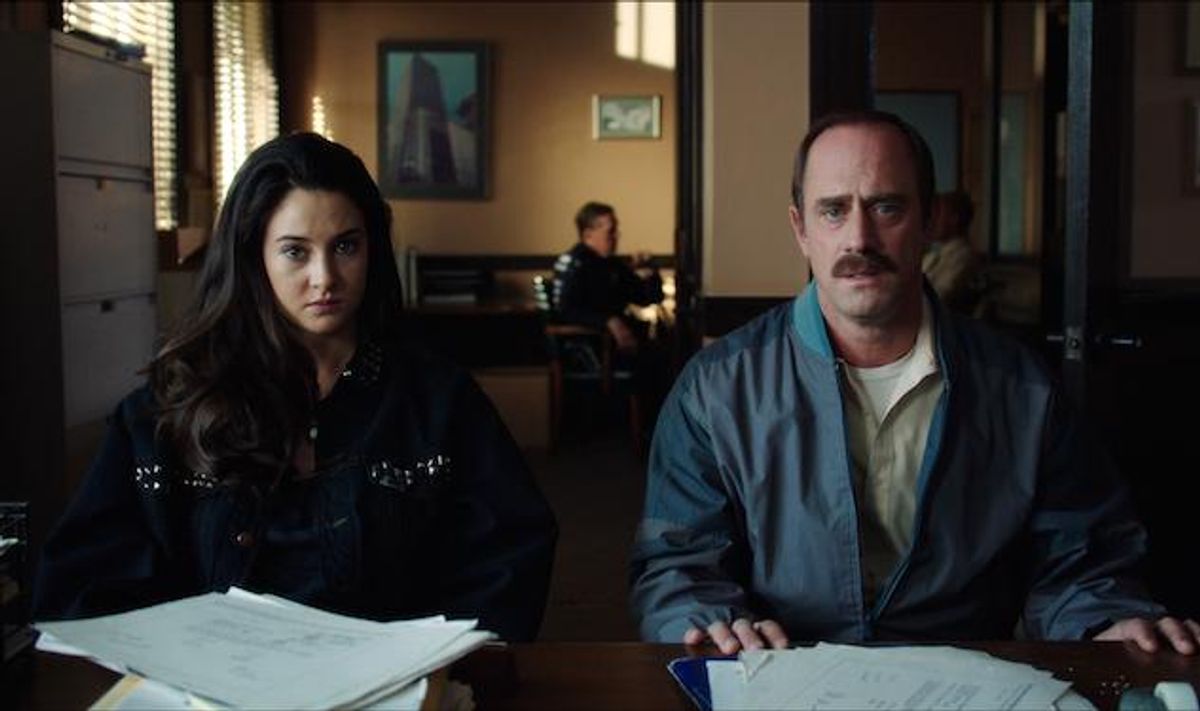Movies
Outing Compassion
Outing Compassion

Gregg Araki connects sex to sympathy in White Bird in a Blizzard
October 23 2014 11:25 AM EST
May 01 2018 11:46 PM EST
By continuing to use our site, you agree to our Private Policy and Terms of Use.
Outing Compassion

Gregg Araki connects sex to sympathy in White Bird in a Blizzard
Even when Gregg Araki identifies with the Other, his gay sensibility stays intact. The heroine of Araki's new film, White Bird in a Blizzard, is a pubescent white girl, Kat (Shailene Woodley), who must deal with personal tragedy at the exact moment of her personal transition: "My mother disappeared just as I was becoming nothing but my body: flesh, blood, hormones." Kat's loss--and gain--is the occasion for Araki's find. Flesh, Blood, and Hormones define his perpetual adolescent storytelling style: pop- and sex-consciousness; music and desire; visual hyperbole and lust.
Kat's bewilderment about womanhood, motherhood and marriage complicate her disapproving view of her passive father and the horny demands she places on herself and her troubled boyfriend across the street. It's hetero soap opera dilemma yet suffused with Araki's identifiably jokey, flirty, gay outsider sensuality. The men in Kat's life are a hyper-masculine pack: Daddy (Christopher Meloni) boasts a porn star's caterpillar mustache and bulges out of his nerdy suits. Detective Theo Scieziesciez (Thomas Jane), the cop investigating her mother's disappearance, is a hairy-chested lothario and her boyfriend Phil, nicknamed Garbage (Shiloh Fernandez), is a scruffy, dirty blond--hot the way Joaquin Pheonix used to be.
These guys are such Araki types that anyone familiar with his best films The Living End, The Doom Generation, Nowhere, and Smiley Face will know where this story is headed. But at least it's headed somewhere--which wasn't the case with Araki's bisexual opus Splendor (1999), where he identified with Kathleen Robertson's dishy dilemma between the arms and limbs of Jonathan Schaech and Matt Keeslar. Araki's erotic empathy with Kat gives depth to this film's exploration of gender roles. Through rubicund flashbacks to her parents' youth, Kat realizes the source of their marital dissatisfaction. This is her anguished account of their mismatch and the slow break-up that drives the mother mad: She pets her daughter, then berates her ("You look like I looked when I was you") and eventually quits the all-American home. It's a neater summary of the roots of teenage anxiety than James Dean's Freudian crises.
For Araki's characters, sexuality proves their humanity--that's the poignant aspect of his gay sensibility. His perspective, set in his bellowed 1980s, is sharper than the film's poetic title metaphor. It sees Kat as more than his alter ego and sees mother Eve as Kat's feared alter-ego. Eva Green's dark-eyed aggression has been featured so much lately (but best in 300: Rise of an Empire) that here, she veers into John Waters camp--then beyond. As the mother of all neurotics, Eve's frustration haunts the film even when Green's not on screen, making this Araki's most powerful tale of emotional repression.
Araki depicts universal horny adolescence onto adulthood and does it more credibly than the sexual frustration in Gone Girl, Far From Heaven, or American Beauty. He makes the film's literary symbolism (from the novel by Laura Kasischke) work in the context of the expressive pop music he loves--from Depeche Mode's sultry "Behind the Wheel" and The Cure's heartbreaking "Pictures of You" to New Order's "Temptation"--so monumental, it nearly overwhelms Kat's confusion. Araki's New Wave benevolence has real tenderness as when Garbage, after deflowering Kat, asks, "You OK?"
That's where Araki's gay pop sensibility works great. It takes what Pauline Kael called "the distilled essence of impure thoughts" and makes them pure. But that sensibility fails him when White Bird in a Blizzard becomes more literary and conventional. Its predictably prurient ending (in fact, a second ending) lacks the flair of the airport farewell scene that balances Kat's teenage sadness and mature resignation. Araki's worst film, the repugnant, self-loathing Mysterious Skin, suggested that perhaps he should only makes movies about the Other. Otherness brings out Araki's compassion; it's what abandoned child Kat and all these characters long for--and what has always been the best aspect of any artists' sensibility.
White Bird in a Blizzard opens in select theaters Oct. 24